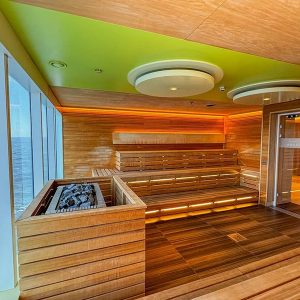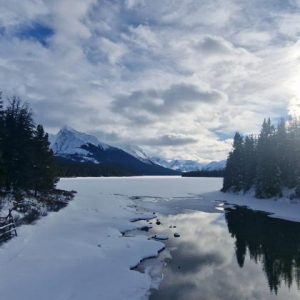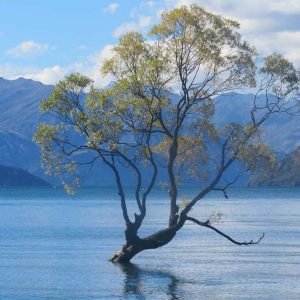A nagging fear among local families on one very special Greek island is that the economy will end up as black as the beaches on parts of its glorious, rugged coastline.
One of the first things to register with you on Santorini – never one of the cheapest destinations, granted – is the colour of the volcanic sand, sometimes white, often red, but mainly black.
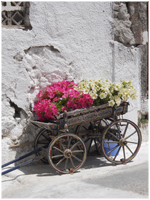 It’s surreal if you’re used to the wide open, usually brown (sandy?)-ish spaces of Lytham St Anne’s or other great beaches in Britain, and it becomes even more bizarre the more you realise you are in one of the most amazing places on the planet.
It’s surreal if you’re used to the wide open, usually brown (sandy?)-ish spaces of Lytham St Anne’s or other great beaches in Britain, and it becomes even more bizarre the more you realise you are in one of the most amazing places on the planet.
Historians have now firmly decided that the gem in the Cyclades was indeed the lost island of Atlantis, nailing the ancient myth about a mysterious, vanished civilisation as pretty solid fact after generations of argument and academic falling-out.
The crescent-shaped, cruise ship mecca towering dramatically out of the Aegean is all that is left after a volcanic eruption of almost unimaginable scale about 1,500BC, causing tsunamis which crippled and may even have destroyed the Minoan civilisation in Crete 70 miles away. The catastrophic explosion buried everything under 30 metres of ash, before the crater collapsed and the sea poured in, leaving a jagged rim which is the Santorini of today.
Continuing finds at ancient Akrotiri could in time put Pompeii in the shade, with emerging evidence of a large and advanced, multi-storey city with a social structure to match, while Britons were still polishing up their axes in the Bronze Age.
The legacy of the eruption is still around, with even the most casual and unaware of visitors noticing wind-carved rocks which look straight off a Star Trek set, cave houses dug into the hillsides and cliffs sculpted into shapes which would be impressive in the Tate Modern.
But the biggest find in the modern capital of Fira, glittering white on the rim of the caldera, is that the current civilisation is very much geared to separating tourists from their cash.
Many of the people who live on the island have had to struggle for years to eke out a living from the land and the sea and are used to hardship, for agriculture was virtually destroyed by an earthquake in the 1950s, and locals have had to claw their way back from nothing to make a living. There’s precious little vegetation apart from grape vines and tomatoes, grown in a very special way to duck the scouring winds, and for many families, it’s still not easy, but they are generally not the ones with their mitts in your pocket.
The parlous state of the Greek economy, which has crumbled like Santorini’s pumice cliffs, has hit everyone where it hurts, but naked avarice can be a real pain, hurting residents and visitors alike. And the penny – or euro – doesn’t take long to drop in Fira.
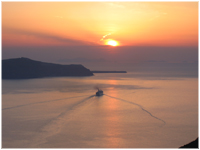 The seriously-rich hotel/club/bar/jewellery and art shop owners at the top of the tourist industry tree, and the moneyed, seasonal business bosses who travel from Athens to cream off summer trade just whack up the prices regardless and tourists with full wallets can take it or leave it. What rankles with residents is that as well as supporting the many small, local produce shops, they try to stretch their budget with trips to the relatively-new Lidl or out-of-town supermarket, only to find the special-offer ouzo, say, at less than 10 euros a bottle, has been snapped up by well-heeled Fira bar owners who will charge more than that for a single measure as you sit on their terraces and join people who have travelled from all round the world to watch the legendary sunsets.
The seriously-rich hotel/club/bar/jewellery and art shop owners at the top of the tourist industry tree, and the moneyed, seasonal business bosses who travel from Athens to cream off summer trade just whack up the prices regardless and tourists with full wallets can take it or leave it. What rankles with residents is that as well as supporting the many small, local produce shops, they try to stretch their budget with trips to the relatively-new Lidl or out-of-town supermarket, only to find the special-offer ouzo, say, at less than 10 euros a bottle, has been snapped up by well-heeled Fira bar owners who will charge more than that for a single measure as you sit on their terraces and join people who have travelled from all round the world to watch the legendary sunsets.
So once you have seen the sun go down from Fira – and it is something you really have to do – swap the legendary sunsets for a glorious rising moon on the other side of the island, where drinks and other essentials are still not cheap, but prices are more down to earth.
Ordinary families in the villages, who have been having a hard enough time of it to start with, are really suffering. They are having to pay much more for the very basics they need to live on and by the time this is passed on, even long-time lovers of Greek island holidays are looking elsewhere – Greece is no longer the cheap and cheerful option it was only a few years ago.
Villagers are still generous to a fault, with touching hospitality even when you know they are hard up, but when snacks and drinks in beach bars can cost the same as in a city centre back here, then your holiday ‘spends’ aren’t going to stretch very far.
Basing yourself away from the capital, in a resort village where people live all year round, is a good start, because they want to keep their communities alive and will welcome you in, so have a good look on the web and shop around, even phoning up small hotels to ask the owners what they can do for you.
 People of a certain age (me) might find the trendy and still-expensive coastal strip around Perissa and Perivolos is too muscle-beach-ersatz-Mykonos, with wall-to-wall tanned, tattooed and near-naked flesh and mindless thumping music, but Kamari, just around the headland, is a better option.
People of a certain age (me) might find the trendy and still-expensive coastal strip around Perissa and Perivolos is too muscle-beach-ersatz-Mykonos, with wall-to-wall tanned, tattooed and near-naked flesh and mindless thumping music, but Kamari, just around the headland, is a better option.
Yes, it’s a bustling resort in season, with tavernas, cafes, bars and restaurants lining the traffic-free road fringing the beach, but it is an established place with family life at its heart. Families like Mantha and Stephanos Chalaris and their pals (and their kids!) welcome friends back time and again to their Black Sand hotel and apartments and Oxygen cafe/bar on the seafront. Put them on the list of people to call and get silver surfing.
Writer and Silver Travel Advisor David Graham (aka SilverCoyote) flew to Santorini on a last-minute holiday flight from Manchester Airport (spotted online, booked by phone, tickets collected at the desk!). Other options included flying to Athens and enjoying a stopover before onward trip by Olympic plane or choice of ferries – good fun if you have the time.

